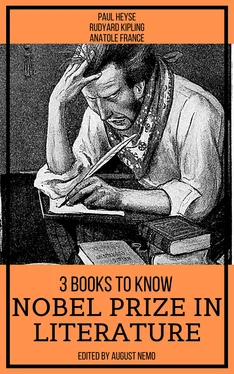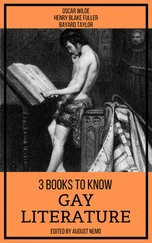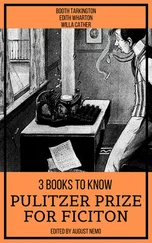"I wish he were less peculiar; we should keep him longer."
Edwin stopped, seized Marquard's arm and whispered: "you fear—"
"Nothing—and everything. His texture is so delicate, a fly might tear it. But possibly it is more tenacious than we think," he added, as he felt Edwin's hand tremble on his arm.
"The wine you sent did him good," he said. "I thank you; it was a kind, philanthropic thought. I can not wish him different from what he is now. He would no longer be the same, if he had the nerves and muscles of a groom. And would he be happier? You don't know how happy he is, what a boundless capacity he has for transfiguring all the poverty around us by the wealth of his own soul, transmuting common dust into gold. If I gave him no cause for anxiety, he would have scarcely anything to desire."
"I have a word to say to you about yourself too, Philosopher. I alluded to it a short time ago in your room, but Balder was present, who is just like a girl; there are certain things which cannot be mentioned before him. Listen man, this disorder of your nerves is entirely your own fault; it's a sin and shame for you to permit that sponge, the brain, to exhaust the best strength of the rest of your organization. How can there be any balance of power? I tell you your whole trouble is to be cured in one way."
"You may be right, Fritz," replied Edwin quietly, as they crossed the courtyard. "But you see it's the same with this medicine, as with the one you just prescribed for Balder. We have not the natures to take it, and if we should force ourselves to do so, the disease would attack a more vital spot."
"Nature, nature!" burst forth the doctor, looking almost fiercely at his friend through his gold spectacles. "I'll answer for it, my son, that your excellent nature, which you have tormented so long with your cursed abstract idealism, that it no longer ventures to grumble—would instantly recuperate and grow merry again, if you would only for once dismount from the high horse of speculation and rely upon your own good common sense. Deuce take it! A healthy fellow like you living on locusts and wild honey, like the hermits in the Theban deserts, and if a woman passes by your cave, exclaiming: Apage, Satanas! I had trouble with you even at the university. But now you seem to wish to continue this course, until nature, so shamefully abused for the sake of mere mind, is overstrained and fairly crazed with impatience."
"A very clever pathological lecture," replied Edwin smiling. "I will request the continuation in our next; there is always something to be learned. But for all that, Fritz, you wont get a kuppel'pelz [3]from me."
"Nonsense! Who's talking about any such thing? But if I, with my constantly increasing practice, can find time for little romances, in which the mind has employment—"
"And also the heart, my boy."
"Well, the heart too, for aught I care, though that muscle is greatly overestimated, and with all your sentimentality, only fit for a dangerous hypertrophy. I'm now on the track of a little witch—"
"A fair Helen or Galatea?"
"Aristocratic, my son, and unfortunately very unapproachable—so far. But what am I thinking about? You must have already made her acquaintance."
"I?"
"Didn't you sit beside her in the box, day before yesterday? At least the doorkeeper told me she always took the same place."
Edwin turned pale.
"I have a faint recollection of it," he replied. "Didn't she sit very far front, and have brown hair, a very fair complexion, blue eyes—"
"Black or brown, my son. But we must mean the same person—and I, magnanimous mortal that I am, solemnly renounce all my claims in your favor."
"Then you must lend me your carriage, to continue this love affair properly," said Edwin, forcing a smile, "for one can hardly pay attention to this princess as a private tutor."
"You need have no anxiety on that score. To be sure I don't know the will-o'-the-wisp very well, she baffled all my conversational powers. But haughtily as she turns up her little nose—by the way it's a nose to rave over—there is evidently something wrong about her. Young ladies who go to the theatre alone, find their company home afterwards. But I will discover in whose cage this bird of paradise has its nest—yesterday I unfortunately came across an old Geheimrath, who wanted to consult me about his liver, just as I was going to follow the proud little nose. If it is as I suspect, you shall see, my son, what a base materialist is capable of doing for his friends."
Laughing merrily, he sprang into his light carriage, took the reins from the coachman and drove rapidly away.
Edwin looked after him. He could not be angry; only yesterday he had himself weighed possibilities and struggled with impressions, which placed this mysterious creature in no more favorable light. But to hear these thoughts expressed by another, as a matter of course, gave him a feeling akin to physical pain.
He had taken two volumes of Göthe to carry to her. Now he thought it would be the wisest course to avoid her house, her presence, and any further intercourse with her. But her face rose before his memory for a moment, her voice sounded in his ear, and all hesitation was over. Suppose she was better than she seemed? And what would she think of the strange man, who had at first forced himself so eagerly upon her, and then never appeared again?
But at least he would not see her to-day, and therefore merely handed the books to the striped waistcoat, and in reply to the boy's question whether he would come in, answered dryly: "It was not necessary, he would bring the next volumes at the end of the week."
As he went down stairs, he praised himself for his resolution and determined not even to look up at her windows. But this was beyond his strength. He even remained standing on the shady side a moment, as if uncertain which way to go, and allowed his eyes to wander, apparently by chance, toward the windows with the palms and the bird cage. He fancied he saw something moving behind the drawn curtains. The thought that it might be a man's head shot through his heart like a burning-iron. He closed his eyes and walked on.
He had promised to commence his lessons at the little house in the lagune to-day. As he mechanically turned his steps in that direction, it seemed almost impossible to retain any connected thoughts. Besides, the interview with the little artist and his daughter appeared as far behind him as if months had intervened, and was a matter of as much indifference as the people who passed him. He resolved to merely go there, excuse himself for to-day, and shake off the whole engagement he had undertaken, as best he could.
But the reception he met with in the little house, baffled his designs.
The artist, clad in his thread-bare velvet coat, with a barette shaped cap set jauntily over his left ear, was standing in the door-way, and as soon as he saw Edwin approaching between the wood piles, turned back into the entry, calling: "He's coming, he's coming!" Then he hastily advanced to meet him, took his hand in both of his, and said: "So I've won my wager, and can exult over my wise child, who for once was not so clever as her old father."
"What was your wager?" asked Edwin.
"Whether you would come or not. Leah said you had only promised, in order to avoid telling us to our faces, that you did not wish to teach such an ignorant pupil. With all your kindness, you glanced around you in such an indifferent way—looked so absent, and in a certain sense weary—"
"My dear sir," interrupted Edwin, "your daughter deserved to win the wager for her penetration. I am somewhat weary and absent-minded, my head is revenging itself because I have racked my brains too often, and the injuries it received cannot be quickly healed. In fact, if it were not for you and your daughter, I should be wiser to defer our lessons till a more favorable time. But if you prefer—"
Читать дальше












